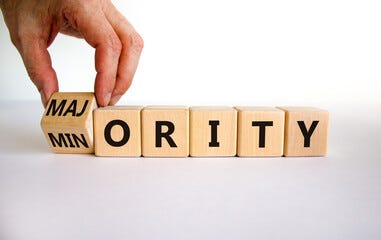Diary of the Late Republic, #20
Majority rule, minority rights: This is the central dilemma, and dynamic, of democracy. You gotta have both, but it's difficult to keep them in balance. At any given time, the political pendulum may swing in one direction or the other, but too much of either can be oppressive. Overweening majorities can lead to mob rule; powerful minorities (like, say, enslaving Southerners before the Civil War) thwart popular will. For the system to function, you have to make allowances for people you really don't like.
In our time, there has been a special emphasis on a particular kind of minority rights: people who have historically lacked power. (Minorities with a lot of power, like financial elites, have continued to exercise it as they have all along, with requisite complaints about their harassment with regulations and taxes.) The template for what might be termed moral minority rights was the Civil Rights movement, which supplied us with the logic, tactics, and incremental outcomes that have characterized social reform in the last sixty years. Ever since, subsequent movements—feminism and gay rights, but also anti-abortion and gun rights—have borrowed the rhetoric and practices of the Civil Rights movement, whether or not their goals were congruent with it.
In the last decade or so, this emphasis on moral minority rights on left and right has reached a fever pitch. Part of this has involved growing conflict over whether those who consider themselves powerless victims are instead imposing their values on everybody else, a dynamic that has resulted in a political stalemate, even as there's good reason to believe that the most vocal voices are not the majority ones. We desperately need leaders who can articulate and galvanize a majoritarian coalition— one that would likely lean politically left and culturally right—to reform our political system.
There’s a vacuum here. I’m hoping that, beginning in 2025, someone will emerge to fill it.

